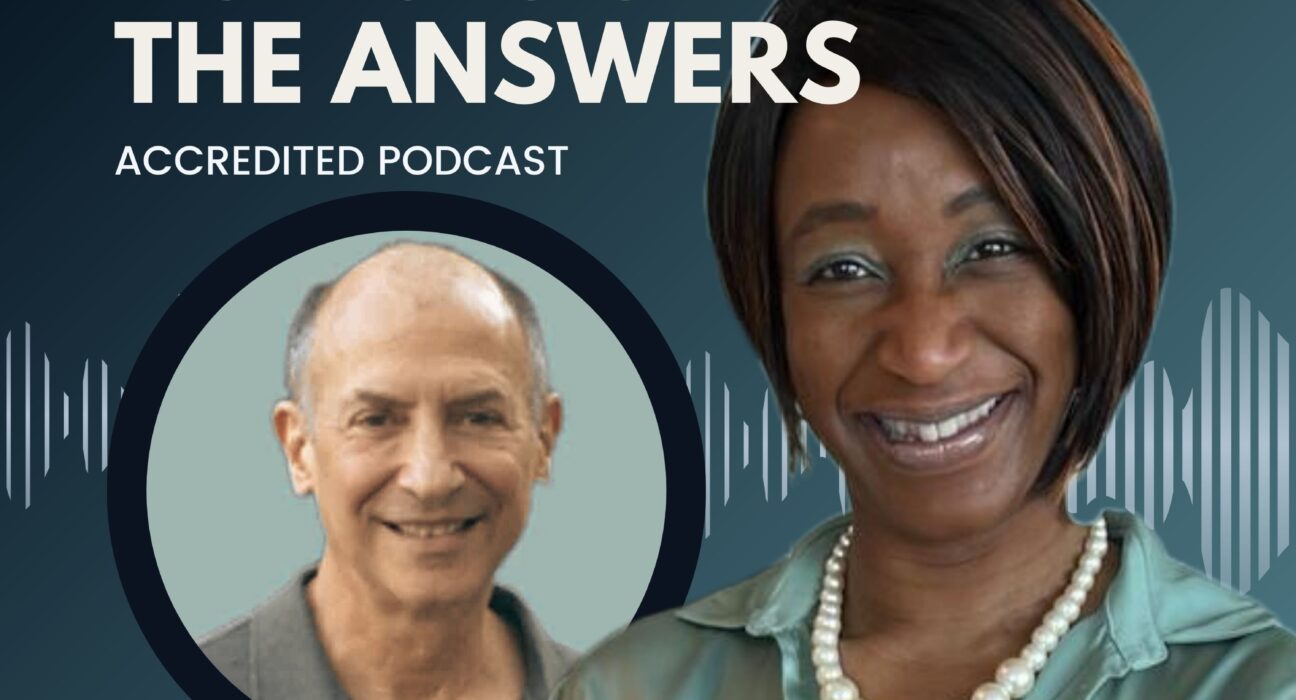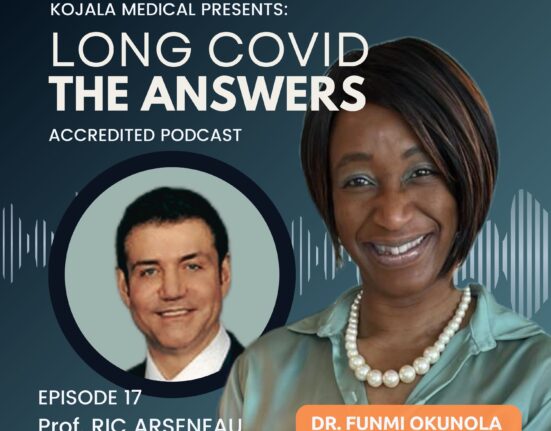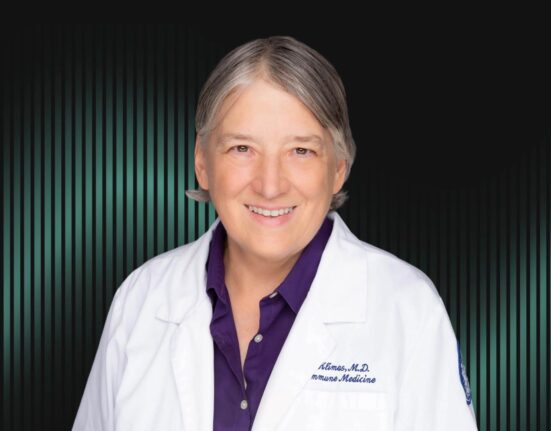
Dr. David L. Kaufman discusses the complexity of diagnosing Mast Cell Activation Syndrome (MCAS), which manifests as multi-system inflammatory symptoms often dismissed by physicians. He emphasizes the need to abandon “silo thinking” in medicine and consider broader perspectives when patients present with seemingly unrelated symptoms. While diagnostic tests for MCAS are available, they are challenging due to processing issues, making clinical suspicion and therapeutic trials essential. Dr. Kaufman notes that MCAS may affect 17% of the population but often remains undetected. He advocates for systemic changes in medical training and healthcare to improve diagnosis and care for these patients.
Guest – Dr David Lyons Kaufmann MD
Note: The podcast has no bias. All conflicts of interest are highlighted with individual guests.
Healthcare Professionals | Earn 0.5 Certified Mainpro+® Credits! Please register/login to claim your CPD/ CEU credits.
Podcast Overview:
Dive into a compelling discussion with Dr. Funmi Okunola and Dr. David L. Kaufman as they explore Mast Cell Activation Syndrome (MCAS), shedding light on its complexities, innovative treatments, and patient-centered approaches.
Highlights & Subject Topics
- Introduction to MCAS: Understanding its prevalence and impact on patient health.
- Diagnostic Challenges: Identifying symptoms and navigating the difficulties in achieving accurate diagnoses.
- Treatment Strategies: Exploring current and emerging therapies for MCAS.
- Patient Care Innovations: Enhancing quality of life through tailored care approaches.
- Insights from Experts: Dr. Okunola and Dr. Kaufman share their clinical experiences and research findings.
- Call to Action: Encouraging healthcare professionals and patients to stay informed and proactive about MCAS.
DISCLAIMER: The information in this podcast is provided for informational purposes only. You should not use any information discussed in this podcast and related materials to make medical or healthcare related decisions. Always consult a your physician or other qualified health care provider with regards to diagnosing managing your medical condition. Any medications or treatments, including any discussed in this podcast, should be initiated and managed by a qualified health care professional.
Podcast Transcript:
Healthcare Professionals: Please note to claim Certified CPD / CEU credits toward your medical license (Canada & reciprocal CPD/CEU Worldwide), you will need to register or log in.
Episode 25 – Mast Cell Activation Syndrome & Long COVID ft Dr David Lyons Kaufman MD
[00:00:00] Funmi Okunola: The information in this podcast is provided for informational purposes only. You should not use any information discussed in this podcast and related materials to make medical or healthcare related decisions. Always consult your physician or other qualified healthcare providers with regards to diagnosing and managing your medical condition. Any medications or treatments, including any discussed in this podcast, should be initiated and managed by a qualified healthcare professional
Funmi Okunola: [00:00:00] Welcome to Long Covid – The Answers. Today’s Episode is entitled “Mast Activation Syndrome and Long COVID”. I’d like to introduce Dr. David Lyons Kaufman MD. Dr. Kaufman completed his medical training at New York Medical College in the U.S.A. He began his internal medicine practice in Greenwich Village in New York City just as the HIV-AIDS epidemic exploded.
As a result, he became deeply involved in the care of HIV positive patients, and in the research aimed at discovering ways to treat both the opportunistic infections they were dying from and the virus that was causing the destruction of their immune systems. As HIV-AIDS became a treatable chronic infection, the practice expanded to include more primary care and general internal medicine patients, and as a result, Dr. Kaufman became involved in the diagnosis and treatment of a variety of chronic and often difficult to diagnose and manage conditions such as tick-borne infections, [00:01:00] hepatitis B and C, fibromyalgia, ME/CFS, and other complex chronic diseases. Dr. Kaufman is a working member of the U. S. Myalgic Encephalomyelitis Stroke Chronic Fatigue Syndrome or ME/CFS Clinical Coalition and part of the guideline committee.
He is a founder and practicing physician of the Center for Complex Diseases based in Seattle and California, U.S.A, which has a focus on patients suffering from complex chronic disease such as Mast Cell Activation Syndrome, ME/CFS and Long COVID. Welcome, David.
David L. Kaufman: Thank you. Thank you very much for inviting me to speak to you.
Funmi Okunola: Do you have any conflicts of interest to declare?
David L. Kaufman: No.
Funmi Okunola: Great. Before we launch into talking about Mast Cell Activation Syndrome or MCAS, as I will refer to it from now on, can you please explain to our non-medical audience and remind our [00:02:00] medical audience what a mast cell is and its relevance in our bodies?
David L. Kaufman: Sure. So, mast cells are part of our immune system, both adaptive and innate. They are, from an evolutionary perspective, truly ancient. They are back earlier in the evolution of our immune systems, and they’re both offensive and defensive cells. They defend against injury and inflammation and infection, and they offensively go after infection and other kinds of problems.
Their greatest density is in the environmental interfaces. So, our skin, our mucous membranes, our gastrointestinal tract, our eyes, but in addition, they surround blood vessels, they surround nerves, and I think it’s most effective to just realize that they are everywhere in our body.
I would add here, and it’ll come up again in a few minutes, they contain over a thousand mediators or chemical cytokines which have [00:03:00] huge activity in our body, and so when a mast cell is activated or, degranulates, it releases a thousand mediators at once, and it’s important to understand that because it helps explain what’s so complicated about mast cell disorders.
Funmi Okunola: Excellent, thank you. What is Mast Cell Activation Syndrome? Can you please give a clear definition that will be understandable to a non-medical audience?
David L. Kaufman: Okay. So, I should preface this first by saying there is controversy in mainstream medicine about this. There’s a so-called consensus one and consensus two group of doctors.
Consensus one has a very strict narrow definition of a mast cell disorder. Consensus two has a much wider description, and part of the consensus with the two group (we wrote a paper to explain all this) was that the two-group developed because we were finding Mast Cell Activation Syndrome everywhere we looked. It’s [00:04:00] one of the things that once you start looking for it, you can find it. Okay. So as a definition, what I would say is along the following lines, it is a condition that causes multi organ, multi system, chronic relapsing, migrating inflammation.
So, one day you might have a symptom related to the neuro system and another time pulmonary symptom, cutaneous skin symptoms and that’s confusing. That’s the nature of mast cells – they’re everywhere. So that’s sort of a clinical definition, and then there’s biochemical ways to diagnose it.
What I would say first, especially to any physicians, clinicians listening, this is a disease or syndrome that requires a high index of suspicion. You have to consider it in order to diagnose it, and if you don’t – I’ll say sort of offhandedly – if you don’t, what happens is so many of our mast cell patients just get swept aside. They get told to see a therapist, [00:05:00] that no disease can do all these symptoms, and they’re just left out to be miserable.
Okay? You need to have an index of suspicion, and then you go after it. You take a very careful history, which is obviously key, and as you take that history, if you ask the questions, you will discover answers which can be very surprising. For example, patients may say, “I was fine until I got COVID”, let’s say.
But then when you take a history, they say “I had allergies as a kid. Certain foods made me sick. They gave me a rash. Other foods gave me a headache. If I went into a department store and smelled the perfume, I felt sick, but nobody said it was a problem. They just said, Oh, you’re sensitive”. Okay. Those are hints of mast cell activation, of mast cell sensitivity, so to speak. Then in terms of trying to get laboratory confirmation, which is not easy, we look at a bunch of several different biomarkers. The common ones that we can measure, I said there’s a thousand mediators, but we can [00:06:00] only measure three or four.
So, histamine – this is from blood, histamine, chromogranin A, prostaglandin D2 and tryptase, of course, and then you can do urine testing as well. If you’ve had endoscopy and biopsy samples, there’s some special stains you can do.
Funmi Okunola: Excellent. People often get mastocytosis confused with MCAS. What’s the difference?
David L. Kaufman: Well, the first difference is mastocytosis is quite a rare disease. Mast Cell Activation Syndrome is extraordinarily common, and we can get into numbers. Mastocytosis is a kind of malignancy. It is an overgrowth of mast cells rather than an oversensitivity leading to activation or degranulation of mast cells. The big difference, and surprisingly, most mastocytosis patients do not have the typical MCAS symptoms. So [00:07:00] it’s a very different disease.
Funmi Okunola: That’s a great explanation actually. That’s even given me some clarity. Can you talk about the triggers of MCAS?
David L. Kaufman: Yeah, so that’s a tough question only because there are so many triggers, right?
I’m going to do this by giving you some brief case patient histories, okay? I would say the first mast cell patient I ever encountered where I knew, I mean where, let me correct that, I’m sure I encountered dozens and dozens over my career, but the first time I realized was a patient who came in and said, “I can only eat (and this is true, okay) rice chex, deli turkey slices” , and I forgot the third, it was a vegetable, and I said, “What do you mean”? She said, “That’s all I can eat”. She is a physical therapist, and she could only eat it at the end of the day, because if she ate anything, any food during the day, she couldn’t work. She would get a rapid heart rate, skin flushing and brain foggy headache feelings.
So, I’m sitting there listening to this, trying to put this together because she looks like a normal person. She’s not lost weight. She doesn’t look skinny or cachectic, and as I perused her history and evaluation workup, indeed, she had elevated markers, and she had Mast Cell Activation syndrome. So that’s an extreme example in terms of food triggers. But a really significant number of MCAS patients have food triggers, and the patient will say, “I’ve learned that if I have these foods, I get brain fog or I get fatigue or my joints start to hurt”, and it sounds to the uninitiated physician like they’re nuts.
It doesn’t make sense to them because unfortunately we’re not trained in our med school training, postgraduate training, to think that way. We just think of separate organ systems, so how could food cause something all over your body, especially if it’s not a typical allergy like a rash? [00:09:00]
Okay. Another example are patients I’ve had who will tell me their symptoms occur when they take a shower. How could that be? So, the water has stuff in it, chemicals, sometimes it’s the hot or the cold that can elicit a symptom. I’ve had patients who get symptoms (and I realize again that to a skeptical physician this sounds like I’m crazy) from vibration – if they’re in a car that’s on a bumpy road that can provoke Mast Cell Activation.
If there’s a change in altitude in a plane, things like that, and then there’s the obvious things that we all learn in our training of quote “seasonal allergy type stuff” which can aggravate underlying Mast Cell Activation Syndrome. That’s why it’s so confusing.
The triggers can be from the obvious to the most ridiculous sounding. By the way, I should add medications. One of the biggest problems for our patients is they often react to the excipients in the medications – the garbage that the [00:10:00] big pharmaceuticals mix into the pill in order to form a capsule or a pill. So, all the dyes and magnesium stearate and all these other chemicals often they need to have compounded meds.
Funmi Okunola: I found it bizarre, but then I came to know somebody who was presenting with all these different allergies that kept changing and diagnosed her after reading it. But the way it helps me to understand is by thinking that the mast cells are in connective tissue, and connective tissue is everywhere. Do you want to talk about that?
David L. Kaufman: Yeah, actually, that’s a great way to think about it – a very good, very good point. It’s a very good point for several reasons. First of all, yes, the mast cells reside in the connective tissue, and we are connective tissue. That’s how we can sit here, stand up, sit down, etc. The very fact that they’re in the connective tissue, if they’re disordered, if the mast cells have this clonal disorder, they’re even sensitive to the pressure and changes in connective tissue in [00:11:00] terms of muscle changes and facial changes and stuff.
But what’s particularly interesting in thinking about it that way is there’s a well known now even accepted in mainstream medicine association between Ehlers Danlos Syndrome, Connective Tissue Disorder, and Mast Cell Activation Syndrome and POTS – Postural Orthostatic Tachycardia Syndrome. So, it’s interesting to consider that the EDS mast cell relation is because they’re kind of in the same place, and as the mast cells degranulate, they are causing more and more connective tissue injury, which is what we do see.
Funmi Okunola: Right. So, if you could explain that a little bit more. Are you saying that the mast cells are a contributory factor in Ehlers Danlos Syndrome in the disease process?
David L. Kaufman: Right.
David L. Kaufman: So, I probably should call this opinion okay because I don’t think we have good literature out there for this. There’s a very good group of NIH papers. I actually think one of the investigators has my middle name, [00:12:00] Lyons, I can’t remember, anyhow, showing the associations in an epidemiologic way between EDS, MCAS, and POTS.
What we see, and when I say we, I’m part of a group of about 600 doctors who talk constantly online listserv kind of thing, present cases, ask for help, etc, etc. We see the following kinds of things happen. A patient presents with connective tissue disorder. They’ve been fine. They’ve had it their whole life almost by definition, right?
We think it’s a genetic disease, and they will describe their early childhood and their teenage years as, “I could bend over backwards and do splits and dance and whatever, and then along comes COVID or mono” – just to keep this simple, COVID or mono, and all of a sudden, their health deteriorates, and part of that deterioration relates to their connective tissue and things that occur as a result.
So, let’s take that [00:13:00] group and put them over here, and then let me mention another group. Then there’s another group of patients that we keep seeing who have no evidence by history of connective tissue disorder, but present with this longstanding chronic inflammation from mono, let’s say, and they end up looking like an EDS patient.
What we think is happening is that as those mast cells degranulate and as there’s chronic inflammation, enzymes that injure connective tissue are released in a chronic or waxing waning way further injuring the connective tissue, and we see it over and over and over.
So, it’s actually a really key point because if you recognize that and think of it, have an index of suspicion and intervene to reduce all the chronic inflammation, you can hopefully prevent a patient from progressing to worsening connective tissue problems like cranial cervical instability and things like that.
Funmi Okunola: Gosh, that’s fascinating. That [00:14:00] definitely needs more research and money into research and exploration. Can you talk about the symptoms of MCAS? How might a person present with this disease?
David L. Kaufman: What I would say is if you’re a physician and a patient comes in, or a healthcare person, whether it’s a PA, an NP, whatever, and they start giving a history that on the one hand you could label as multi-system inflammation, meaning they complain about headaches and stomach aches and joint pains and rashes that they get and flushing, try not to just say, “Oh, this patient must be nuts” because those are symptoms of mast cell degranulation. So, you know you’re index of suspicion, again your radar, should go up when somebody comes in and describes a disorder or symptoms that initially don’t seem to make sense.
They don’t fit into the way you were trained. They don’t come in and say, [00:15:00] “I have chest pain when I walk upstairs”. Well, that’s easy for you and me. You and I know when somebody says that you’ve got to think about angina. For these patients, it’s not that easy. They don’t come in and say, “I only wheeze when I am next to a cat”. Okay, they come in and say, “I wheeze when I walk into Nordstrom to a department store”.
That doesn’t make sense so don’t let yourself, as a physician be trapped by the fact that it might not be the way you were taught. These patients have real symptoms, and they’re just trying to describe them. So, anyone that comes in with a multi-system inflammatory like set of complaints, I would be suspicious of mast cell.
If they’re then able to say, “Actually, I only get these problems or most often get them when I eat certain foods, or I go into certain locations, or I take certain pills or supplements”, that’s going to be another tip off.
Funmi Okunola: Yeah, I can think of a whole group of patients when I had my practice. I don’t have my practice anymore. [00:16:00] Mostly women that now I realize probably had MCAS, a whole load of them, and I would do multiple tests. I would send them to allergists, and I would have unsatisfactory outcomes. We would just throw our hands up, and then the patient becomes resigned to living with it to a degree.
Some of it was managed with antihistamines, but not. So, I really feel that I’ve been enlightened by learning about all of this, and I feel sad that I wasn’t enlightened beforehand, before I gave up my practice.
David L. Kaufman: This is the same for me. All right, for me it’s the same experience, and I’m sure I sort of learned about this about ten, twelve years ago, but I got decades before that, and I’m sure I missed it in all my patients.
Granted, the patients I was seeing back then had life threatening illness, so there was something else going on, different priorities, so to speak. But yeah, I think all of us have missed patients like this. Now [00:17:00] I’ve been seeing them for ten-plus years, and I’m still amazed when somebody says to me, “I took the certirizine and the famotidine and I feel much better”. How could these two cheap over the counter drugs work like that? And yet you see it over and over.
Funmi Okunola: Totally. What is the prevalence, i. e. the total number of cases of MCAS in any given population? And is there a difference in sex distribution of MCAS?
David L. Kaufman: So based on work done, I think both in Europe and here, it’s estimated to be about 17% of the population, which is huge, really huge, and I think it’s important to understand that that doesn’t mean 17% of the population is walking around dreadfully ill with Mast Cell Activation Syndrome.
I think that meant that some, a portion, a big portion of the 17% have a kind of background illness. I tend to call it noise, and they just learn how to live with it, and they’re okay. What we as clinicians [00:18:00] frequently see in this group I’m part of talk about all the time is those patients who get an infection, mono, COVID, Borrelia, Bartonella, Babesia, and their mast cell explodes. It’s important to understand. It’s common, but not necessarily as disabling as the population that I end up seeing.
Funmi Okunola: Given that MCAS has roughly the same prevalence as diabetes in our populations, why has it been so ignored by the medical profession?
David L. Kaufman: Well, I think it goes back to what I’ve been saying, was saying before, and something you and I were talking about before we started. We are trained to think in organ systems, right?
So cardiac, pulmonary, renal, gastrointestinal – it basically creates a kind of silo thinking, and then what’s happened, certainly in the U. S., that has exploded into all these specialties and subspecialties. So, these days you go to a primary [00:19:00] care and you complain of coughing. They were likely going to refer you to pulmonary or with chest pains to cardiac.
If you have somebody who walks in and says, “Well, actually I have chest pain and I have coughing and my joints hurt and I have rashes and headaches and I can’t think straight, I’m brain foggy”. That doctor’s not going to know what to do with you because they’re trained to think in separate organ systems – what I keep calling ‘silo thinking’, and it’s very sad.
Internal medicine training used to be full body training, not silo, and that’s just changed and that’s part of the problem. Doctors like yourself and me and all of our colleagues who are in this working with Long COVID and MCAS etc, need to do everything we can to try to have doctors broaden their view, pull back to wide angle lens, not the telephoto lens, and that’s very difficult because of the training. It’s [00:20:00] difficult in our country because of our messed-up healthcare system where you’re only allowed to see a patient for ten minutes if you work in a hospital clinic, that kind of thing. I think that’s what has to change.
Funmi Okunola: Yes, we need to create a revolution in medicine really.
David L. Kaufman: Okay.
Funmi Okunola: Could a primary care physician diagnose MCAS in the community?
David L. Kaufman: So obviously, as I said before, taking a history and while taking the history trying to keep in mind what we were discussing about how MCAS presents. There’s two points I’d like to make. One is in terms of laboratory testing, that the tests that I mentioned, histamine, tryptase, chromogranin A, and prostaglandin D2, they’re not easy to run. Quest runs them and LabCorp runs them. If they’re not properly processed by the lab tech, they rapidly decline in the levels. They get rapidly metabolized down, and that’s specifically particularly true for the histamine and the prostaglandin D2. [00:21:00]
So, if they’re not ideally drawn into a chilled tube, immediately spun, immediately aliquoted, and then frozen, if you get a normal level and it wasn’t processed right, you can’t really believe that normal level, okay? In general, there’s no lab that does what I just said. So, I still try to order those tests, and I would urge other physicians to order them. But if they come back normal, keep in mind, one of the things you learned in school, if you have a clinical suspicion that may trump labs, whether they’re abnormal or normal, okay, and sometimes you repeat them, maybe you can talk to the lab and try to get them to at least freeze it more quickly or spin it more quickly. Tryptase almost always in mast cell patients actually comes back normal which goes against everything we were all were taught, so I actually sometimes don’t even order it just to save money.
Okay, Chromogranin A is a great test because it doesn’t need to be frozen. So, if that comes [00:22:00] back abnormal, it may be your best signal that your clinical suspicion is correct. The other lab tests that can be very helpful if at any time the patient has had upper or lower endoscopies and biopsies that were taken for whatever reason, those are usually samples kept in the past lab for five to seven years.
You can request CD117 staining, which stains from mast cells, and ask them to count. This is the part you have got to very specifically tell the pathologist – count the number of CD117 positive cells per high power field. This has nothing to do with aggregation, which is what they think you’re looking for. It’s just a number, and the general accepted upper limit of normal is twenty. If you see more than twenty in a high-powered field, that’s another laboratory confirmation, histology confirmation of MCAS. That’s one way. So, history, testing, and the third way, which I think is in many ways the most [00:23:00] important way, is a trial of medicine.
Something we do in medicine all the time. Doctors do it all the time. But for some reason they don’t like to hear this idea. Just say, “Hey, I think maybe you have MCAS. Let’s just try a histamine 1 receptor blocker like cetirizine and a histamine 2 receptor blocker like famotidine or pepsid and Zyrtec are their brand names – take them twice a day. I recognize that’s twice the dose on the bottle for cetirizine but take them twice a day and see what happens. Those drugs do not cause side effects. Almost never. They’re very cheap. You don’t even need a prescription”, and over and over and over, a patient will say, “You know, my brain fog has cleared up. It’s the weirdest thing from an antihistamine, or I can eat foods without getting sick”. So, a trial of therapy and a response to therapy is very compelling for the diagnosis.
Funmi Okunola: As a practicing family physician, listening to you, the way I would approach a patient coming into my office is that I would have that clinical [00:24:00] suspicion because now I’m enlightened about MCAS, and I would do the trial treatment, and then if that had a positive result, I’d refer them to you.
So hopefully I have a list of MCAS physicians, and there are a few in my area. Then I would refer them because those tests that you mentioned are complex. I wouldn’t be familiar with them, and I doubt very much my lab would do them, and if they did do them, they wouldn’t do them correctly.
David L. Kaufman: Can I respond to that?
Funmi Okunola: Yes.
David L Kaufman: So, I don’t really agree.
Funmi Okunola: Um,
David L. Kaufman: I don’t know the lab limitations in Canada, so let’s move it over here for a minute. I don’t see why any primary care physician, family practice, internal medicine, peds, med, trained, any of those can’t do what I’m saying. These tests are routine. They’re right in the LabCorp Quest test menu. There’s nothing fancy about [00:25:00] these tests. The CD117 staining of the endoscopy stuff, that’s a little fancier, and it usually requires arguing with pathology. So, if you want to leave those out, fine, but you can just order those four tests I said, all right?
More importantly is, Suspected? And then, are you thinking a GP can’t try Claritin and…
Funmi Okunola: Oh, no,
What I would do is have the clinical suspicion, and then if I felt that I really think this is the case, then I would trial the antihistamines and the other treatments.
David L. Kaufman: Okay, and then I would suggest that before you jump to referring to an MCAS doctor, first I’d say, “How are you going to find that doctor? There aren’t that many”. Secondly, it’s not that complicated. All right. When I started practice and was doing HIV medicine, I used meds that I never learned anything about.
I had to learn how to treat pneumocystis pneumonia. Nobody taught me that. I had to figure it out and read about it and use drugs that I never was [00:26:00] trained in, and for MCAS, it’s the same thing. It’s not that hard to learn after you use H1 and H2 blockers, then you can graduate or include mast cell stabilizers, which are drugs like ketotifen and cromalin.
Those are readily available drugs, right? Then you can use common plant flavonoids like quercetin and luteolin. I don’t think that’s so hard to learn is all I’m trying to say. I would rather educate more family practitioners to do it than have them refer to me, is what I guess I’m saying.
Funmi Okunola: Yeah, I think that’s an excellent point. We can’t refer every diabetic that comes into our offices. We only refer the ones that are really difficult to treat and complex. So, I think you’re right. That ‘s the way to approach it. But I think it’s the confidence. I think there needs to be some form of support, or maybe some form of Echo program, or it needs to be something that we work with you to develop an education program for physicians to [00:27:00] help them to feel confident to manage and diagnose this.
A lot of MCAS symptoms are similar to Long COVID symptoms. How do you tell the difference between the two?
David L. Kaufman: So, I’m going to try to answer that a different way from the way you asked it. I think that I would present it this way. A patient has COVID and develops Long COVID. What does that mean? Usually what it means is they say, “I had a mild illness of COVID, Acute COVID. I did or didn’t take Paxlovid. I did okay. But ever since that illness, I have not been okay”. Well, what do you mean by that? The patient says, “I’m tired. I have a fatigue that’s out of proportion to anything I’ve ever had. I get overly exhausted, (what we call Post Exertional Malaise after certain levels of activity), which can put me in bed for a day or two. I have trouble processing and [00:28:00] multi-tasking and finding words when I talk”. All of which, by the way, are the symptoms that diagnose ME/CFS. Okay. They don’t usually or necessarily say, “I have Long COVID, and my only symptoms are mast cell activation symptoms”. All right. On the other hand, I have probably 80 or 90% of my Long COVID patients who have MCAS.
So, I want to be careful in the way we’re looking at this. Long COVID is the bigger picture, and a piece of that big picture is Mast Cell Activation Syndrome. I do think it’s a key piece, and as I’ve said a few times, infection seems to activate mast cells inappropriately, especially in those people who have a pre-existing mast cell clonal disorder. It’s like fuel on the fire, you know?
Funmi Okunola: So, then are you saying, which was my next question, that SARS-CoV-2 virus triggers MCAS in a proportion of patients in [00:29:00] our populations?
David L. Kaufman: Again, I think there are two answers here. One, in the research, in the relatively early, clinical handling of SARS-CoV-2, and then in the research, it was clear that that virus does something with mast cells.
There is a direct interaction starting mostly in the respiratory system, and that’s why early on we learned for Acute COVID to give the patients H1 and H2 blockers, which made no sense if you were thinking about infection. So yes, the virus does something to mast cells. But I’m also suggesting that in a population of those patients, even before they had COVID, they had more mast cell activation than the next person.
They had some predisposition which was a kind of background noise. It didn’t ruin their life. They could manage, they just ran their life. They learned to take cetirizine once or twice a day. They learned to avoid certain things, and then along comes COVID, and it’s just like pouring [00:30:00] gasoline, kerosene and anything else you can think of on their mast cell condition, and bam, they’re in trouble.
Funmi Okunola: Fascinating. Do you think the vagus nerve plays a role in the cause of MCAS?
David L. Kaufman: I just don’t know the answer to that. I mean, I think we all want the vagus nerve to be involved because then we think, well, that’s an easy target, we can get there and do something about it. I think it has to be involved in the overall illness picture, Long COVID, and probably involved in MCAS.
It is an afferent, efferent, you know, signals in both directions. It tells the brain you’re sick, and then the brain does something to transmit sick syndrome to the rest of your body. So, there’s clearly an intimate relationship. But what role mast cells play in that, I just don’t know the answer. I’m sure it must play a role, but I don’t know it.
Funmi Okunola: The reason why I asked is because the vagus wandering nerve, it basically innervates virtually every organ in our body. [00:31:00] Exactly. So, all the different symptoms that we’re seeing in Long COVID and MCAS, so yeah.
David L. Kaufman: So, as you just said, the vagus is everywhere. It’s like tentacles all over our body. It’s an amazing piece of evolution. At the same time when we look at these illnesses in our patients, and I’m getting a little away from MCAS now for a second, if we look at Long COVID, and we think about how Long COVID patients present, they never present with just one problem. Alright, they have POTS, they have their MCAS, they often have GI symptoms, they often end up having or have always had connective tissue disorder, they have infection, and all of these things interact.
They’re not just working in these silos or in vacuums. So, when their POTS flares, that kicks off mast cell degranulation. When their mast cells degranulate, that makes their POTS worse and also their brain fog worse. When their brain fog is worse, they may make their GI stuff [00:32:00] worse. It’s all interacting, and it’s a really key concept.
Funmi Okunola: Yes, and that’s why I think the vagus nerve is intimately involved because it innovates the gut, it innovates the brain, it innovates all these different organ systems. In our earlier Episodes we discussed this, but yeah, I just thought I’d put it to you. It obviously needs more exploration. Where do you feel research into MCAS and Long COVID should go?
David L. Kaufman: Well, if we want to about talk silver linings for a minute, COVID has provided us with an opportunity to accelerate our understanding of infection associated illnesses, which has been a somewhat neglected area in medicine. We know how to treat strep throat, we know how to treat overwhelming sepsis, okay?
ICUs are just filled with people who know so much about how to do it. But what we’ve never really put our attention to is what happens to that person after that infection, [00:33:00] and that ME/CFS is an example of that, but it’s been ignored for half a century in terms of research. COVID is clearly doing that. It is creating millions of people who have post infectious associated fatiguing illness. There are a million different names out there, but call it what you want, to me Long COVID and ME/CFS are virtually the same.
So, the research opportunities are incredible. I don’t want to dodge your question a little bit and not look at it as what are the opportunities for MCAS, but what are the opportunities for these post infectious illnesses?
We need to look at the impact on the illness causing autoantibodies which contribute to the pathology, contribute to the POTS, contribute probably to MCAS in some patients. We need to look at whether there really is residual spike protein, little bits of infection hanging around, that may be true for COVID, but could also be true for mono.
We know EBV never leaves our body, so it’s the same concept if you think about it. What’s the role of sticky, [00:34:00] sludgy blood in microclots? Right, it’s come up in Long COVID, but if we look a little bit backwards now, in the past, it looks like it’s very relevant in ME/CFS, and it’s probably relevant in lots of the other post infectious illnesses.
So, it is a goldmine of potential research to understand these things. For me, I relate it back to HIV. When HIV hit the streets, we didn’t know anything. I mean, you couldn’t measure a T cell count before HIV in a common office like my office, and all of a sudden, I could order CD4 counts, and we began to understand the role of how the immune system and these opportunistic infections interacted and occurred, and the development of these anti-retrovirals. If you think about how fast that began to happen it didn’t feel that way to the patients and to doctors like me, but it was in fact very, very fast. So, it’s another huge opportunity like that
Funmi Okunola: Yeah. Oh, that’s a fantastic answer, David. I just want to thank you so [00:35:00] very much for coming onto the program and enlightening us about Mast Cell Activation Syndrome. It’s been a very rich, rewarding and educational interview for me, and I’m sure for all of our followers out there. I’d also like to thank you for everything that you do for people suffering with complex chronic disease everywhere.
David L. Kaufman: Thank you very much. And thank you for inviting me to join you on the show. It was really, really fun and interesting.
Funmi Okunola: Thank you. Please join us for next week’s Episode of Long Covid – The Answers.
Funmi Okunola: Some questions for listeners to consider.
What are your top five takeaways from this Episode?
How will this Episode change your practice or perception of this disease?
What will you do to act on what you’ve learned?
Please discuss your thoughts on our social media outlets such as Twitter or X, our website blog, Instagram, Facebook, LinkedIn.
Please rate this Episode.
SHOW NOTES:
Dr David Lyons Kaufman is interviewed about Mast Cell Activation Syndrome. Dr Kaufman is a working member of the U.S. Myalgic Encephalomyelitis/Chronic Fatigue Syndrome (ME/CFS) Clinical Coalition and part of the Guideline Committee. He is a founder and practising physician of the Center for Complex Diseases based in Seattle and California, USA which has a focus on patients suffering from Complex Chronic Disease such as Mast Cell Activation Syndrome ME/CFS & Long COVID.
REFERENCE








